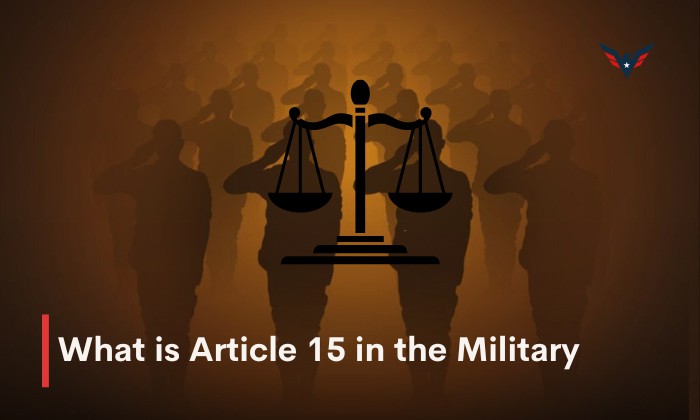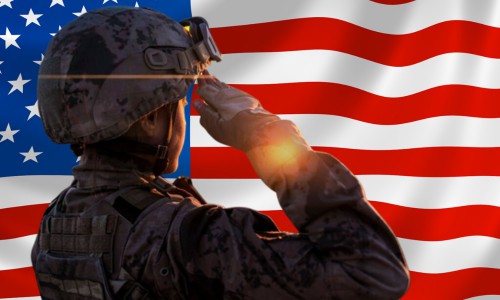The military is guided by a strict set of regulations designed to ensure discipline and order within its ranks. Among them is Article 15—a provision in the Uniform Code of Military Justice (UCMJ) that grants commanders the authority to administer non-judicial punishment (NJP) for minor offenses committed by military personnel.
In this blog post, we will answer “What is Article 15 in the military,” delve into its intricacies, explore its purpose, procedures, punishments, and address frequently asked questions.
Table of Contents
Overview of Article 15 and Its Purpose
Article 15 serves as an alternative to the formal court-martial process for handling minor military offenses, such as insubordination, reporting late to duty, or minor traffic violations.
The purpose of Article 15 is to be an efficient and fair way to address minor misconduct within the military justice system. In other words, its main purpose is to address disciplinary matters promptly and maintain good order and discipline within the military without referring the case to court-martial
1. Procedures of Article 15
An Article 15 begins with the commanding officer conducting an investigation to ascertain the facts surrounding the alleged misconduct. If the investigation reveals evidence of wrongdoing, the commanding officer may opt to impose non-judicial punishment under Article 15
In this case, the offending military personnel will receive a reprimand, usually in the form of a written notice. They will then have the right to either inquire further questions or demand trial by court-martial, which can result in worse punishments if they’re found guilty of the alleged charges.
Afterward, the soldier can talk to a lawyer before making elections and after the first hearing. The decision regarding the soldier’s punishment (or lack thereof) will be informed in the second hearing, after which the defendant can accept or appeal. In the latter case, they will be brought to court-martial for further inspection.
2. Who Can Administer Article 15?
In the U.S. Army and Air Force, Article 15 is administered by a commanding officer who has the authority to convene a court-martial, such as abrigade commander or battalion commander.
However, in the Marine Corps and Navy, an officer in charge will have the authority to impose Article 15.
In addition, the rank of the officer who imposes Article 15 will reflect the severity of the crime. A commanding officer who holds the rank of lieutenant colonel, colonel, and major can administer a field grade Article 15, which is more severe than a company grade Article 15 imposed by one who holds the ranks of captain and below.
3. Court-Martial vs. Article 15
A court-martial is a formal trial conducted under the UCMJ, resembling a civilian court proceeding. A panel of military members serves as the jury, and if found guilty, the accused may face severe penalties, including dishonorable discharge and imprisonment.
In contrast, Article 15 is an administrative proceeding handled by the service member’s commanding officer. The punishments imposed under Article 15 are less severe and limited in scope.
Types of Article 15 Military Punishments
Article 15 allows for a range of punishments, depending on the severity of the offense and the level of the commander administering the punishment.
Here is a punishment chart for your reference regarding summarized Article 15:
| Oral Reprimand | A verbal admonishment expressing disapproval of the service member’s actions. |
| Written Reprimand | A formal, written reprimand detailing the offense and consequences. |
| Forfeiture of Pay | The loss of a specific amount of pay for a designated period. |
| Reduction in Rank | Demotion to a lower enlisted grade or reduction in officer rank. |
| Extra Duty | Assigned additional work or duties for a specified duration. |
| Restriction | Limitation of movement to a specified area for a certain period. |
| Correctional Custody | Confinement to a designated facility for a limited time. (maximum punishment lasts for 60 days) |
Frequently Asked Questions (FAQs)
Army Article 15 regulation, how does Article 15 align with UCMJ Army?
Article 15 is governed by Army Regulation 27-10, which provides detailed guidelines on the administration of non-judicial punishment within the Army.
Can an Article 15 result in discharge from the military?
Article 15 itself does not result in discharge, but the punishment imposed may affect a service member’s career progression and potential for reenlistment.
What is an example of an Article 15 in the Army?
An Article 15 Army example would be a situation where a service member is found guilty of repeatedly violating regulations regarding proper uniform wear.
Conclusion
We hope we’ve helped you understand what is Article 15 in the military. By comprehending the procedures, punishments, and purpose of Article 15, service members can navigate the military justice system with clarity and ensure the continued readiness of the armed forces.
Note: This article provides a summarized overview of Article 15 and is not a replacement for legal advice or military regulations. For specific guidance, refer to the relevant military regulations and consult legal professionals or military experts.

I am Everett Bledsoe, taking on the responsibility of content producer for The Soldiers Project. My purpose in this project is to give honest reviews on the gear utilized and tested over time. Of course, you cannot go wrong when checking out our package of information and guide, too, as they come from reliable sources and years of experience.




